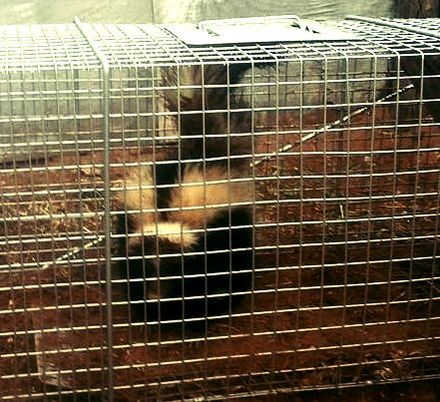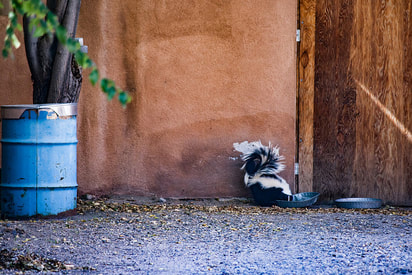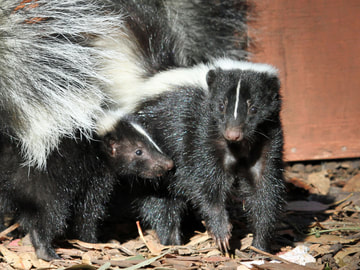 Baby Skunk I captured outside my chicken coop 2017
Baby Skunk I captured outside my chicken coop 2017
I have had quite a bit of experience keeping skunks away from my chickens and I want to share these with you. Every night around 9:30 to 10:30 I would smell the faint odor of a skunk near my chicken coop. This told me my chickens were in danger. I knew I had to do something so I purchased a live trap. I caught several skunks in the same place, a small hole they had dug under the fence was how they were getting in so I placed the trap on the inside of the fence and put boards up so they wouldn't see it. I left the opening and put the trap there. This worked five times as you can see by the photo of the baby skunk I caught. I actually caught the mother first. I managed to catch all but two skunks. An adult I suspect is the father and one last baby skunk. I discovered this completely by accident. I feed my cats at night on my porch. One night I opened the door and the two skunks walked away, they didn't run nor did they seem bothered much by my presence as I just stood there as still as I could, praying they wouldn't spray me. Try as I might I was unsuccessful at capturing these last two skunks but eventually, I did successfully capture them. I tried removing things that attract the skunks, predator lights, live traps, cameras, motion sensor lights, portable electric fencing, and hardware cloth. If you smell the acrid odor of a skunk you need to take at least a couple or all of the following precautionary measures to protect your chickens.
Get Rid of Things that will attract skunks to your chicken coop

Skunks like to eat both plants insects, rodents, lizards,salamanders, frogs, snakes, birds,larvae, moles, berries, roots, leaves, grasses, fungi, nuts, honey bees, and chicken eggs.
Eggs-Skunks love to eat eggs. Collect your chicken eggs every day and change nest bedding if an egg has broken in it. The smell of eggs attracts them.
Dirty nest boxes-Nest boxes still smell like eggs even after the eggs are removed. If you use rubber nesting pads you can easily see and clean them.
Pet food-Skunks love to eat dog and cat food. I used cat food to bait the last two skunks into my trap. (Caught a couple of my cats too).
Garbage-Skunks have also been know to dig in trash looking for food.
Dead carcasses-A very hungry skunk will even eat on the dead carcasses of birds, rabbits, and rodents left behind by cats or other animals.
Dirty bedding-Skunks sniff out their food, they may not see your chickens or their eggs but they can smell them and will try to dig into your chicken coop.
Find and seal off where the skunks are getting in. Usually there will be a hole dug under a fence or building, or coop. If you have had skunks for a while there may be a small path leading to your chicken coop.
Things to watch out for...
It is not uncommon to find holes on your property where a skunk has dug a hole looking for grubs and worms.
If you have honey bees and find that the front of the hive is scratched up, most likely this is the work of a skunk who has eaten the guard bees which came out to investigate.
"Skunks are not true hibernators in the winter, but do den up for extended periods of time. However, they remain generally inactive and feed rarely, going through a dormant stage. Over winter, multiple females (as many as 12) huddle together; males often den alone. Often, the same winter den is repeatedly used. Although they have excellent senses of smell and hearing, they have poor vision". (1). See more below...
Eggs-Skunks love to eat eggs. Collect your chicken eggs every day and change nest bedding if an egg has broken in it. The smell of eggs attracts them.
Dirty nest boxes-Nest boxes still smell like eggs even after the eggs are removed. If you use rubber nesting pads you can easily see and clean them.
Pet food-Skunks love to eat dog and cat food. I used cat food to bait the last two skunks into my trap. (Caught a couple of my cats too).
Garbage-Skunks have also been know to dig in trash looking for food.
Dead carcasses-A very hungry skunk will even eat on the dead carcasses of birds, rabbits, and rodents left behind by cats or other animals.
Dirty bedding-Skunks sniff out their food, they may not see your chickens or their eggs but they can smell them and will try to dig into your chicken coop.
Find and seal off where the skunks are getting in. Usually there will be a hole dug under a fence or building, or coop. If you have had skunks for a while there may be a small path leading to your chicken coop.
Things to watch out for...
It is not uncommon to find holes on your property where a skunk has dug a hole looking for grubs and worms.
If you have honey bees and find that the front of the hive is scratched up, most likely this is the work of a skunk who has eaten the guard bees which came out to investigate.
"Skunks are not true hibernators in the winter, but do den up for extended periods of time. However, they remain generally inactive and feed rarely, going through a dormant stage. Over winter, multiple females (as many as 12) huddle together; males often den alone. Often, the same winter den is repeatedly used. Although they have excellent senses of smell and hearing, they have poor vision". (1). See more below...
Do Skunks Kill Chickens?
As a general rule skunks do not kill chickens but they may maim them. In my experience, no skunk has killed any of my chickens, tho they have brutally attacked one poor little hen that tried to protect her eggs from the skunk. That is not to say that a hungry skunk will not kill a chicken as there are some who will and I assure you it can and has happened but it is rare. "Skunks do not kill many adult birds. In general, when a skunk attacks a flock, it kills only one or two birds and mauls others considerably. Also, skunks love eggs. Usually, a skunk opens an egg at one end and punches its nose into the hole to lick out the contents. Eggs that have been eaten by a skunk may appear to have been hatched, except that the edges of their openings are crushed. A skunk may remove eggs from a nest but rarely carries them more than 1 meter (3 feet) away" (2).
How to protect your chickens from skunks

Remove the things that attract skunks is the first thing to do and then it's time to secure the premises. Look for holes, dig marks, skunk scat, a worn path leading to your hen house that you did not make. If possible get inside the chicken house and check floors, walls, seams of walls, by windows and vents for signs that a predator has tried to get or has gotten in..or worse case scenario..is still in there.
Secure 12 to 24 inches of hardware cloth on the bottom of your coop on all sides to prevent skunks and other predators from entering.
Set live traps as soon as your chickens are locked securely in their coop. Use eggs, dog or cat food, or sardines for bait and change the bait up after you catch one or two skunks.
Retrieve your eggs daily and make sure there are none in the coop before you lock up.
Keep bedding as clean as possible
Build a covered cage around your coop and bury the bottom 6 to 12 inches
Use non toxic odor eliminators or neutrelizers to cover the smell of your chickens (sprinkle baking soda and use herbs into their bedding and nest boxes).
Bathe your chickens regularly to cover their scent
Use portable solar powered fencing around your coop and run area
Predator lights work to deter skunks and other predators for a short time but if you do not move the lights regularly (at least once a week) the skunk quickly figures out that the lights won't hurt them.
Use motion sensor lights for two reasons. One it will startle skunks and other predators when the light comes on and two you will know when they are out there.
Use cameras to figure out how the skunks are getting on your property or near your coop.
Motion activated sirens will scare away skunks and predators. (They will also terrify burgler's...and your neighbors).
Odor deterrents. Skunks do not like certain odors like citrus, mothballs, ammonia, and predator urine.
I have had much success keeping skunks away with non toxic odor neutralizers which I use inside and outside of the chicken coop and runs.
See more below...
Secure 12 to 24 inches of hardware cloth on the bottom of your coop on all sides to prevent skunks and other predators from entering.
Set live traps as soon as your chickens are locked securely in their coop. Use eggs, dog or cat food, or sardines for bait and change the bait up after you catch one or two skunks.
Retrieve your eggs daily and make sure there are none in the coop before you lock up.
Keep bedding as clean as possible
Build a covered cage around your coop and bury the bottom 6 to 12 inches
Use non toxic odor eliminators or neutrelizers to cover the smell of your chickens (sprinkle baking soda and use herbs into their bedding and nest boxes).
Bathe your chickens regularly to cover their scent
Use portable solar powered fencing around your coop and run area
Predator lights work to deter skunks and other predators for a short time but if you do not move the lights regularly (at least once a week) the skunk quickly figures out that the lights won't hurt them.
Use motion sensor lights for two reasons. One it will startle skunks and other predators when the light comes on and two you will know when they are out there.
Use cameras to figure out how the skunks are getting on your property or near your coop.
Motion activated sirens will scare away skunks and predators. (They will also terrify burgler's...and your neighbors).
Odor deterrents. Skunks do not like certain odors like citrus, mothballs, ammonia, and predator urine.
I have had much success keeping skunks away with non toxic odor neutralizers which I use inside and outside of the chicken coop and runs.
See more below...
Live Animal Traps
If you use a live animal trap and capture a skunk or other live predator it is best to call your local animal control, local animal shelter or police to find out how to dispose of them. Different towns have different laws. Do not handle the trap with your bare hands when a predator is inside as many will try to scratch or bite you and may be able to reach through the bars of the trap. A skunk will most likely spray you if you get near them while trapped. If you approach the trap use a plastic tarp held out in front of you and quickly cover the trap.
Will A skunk Harm Your Baby Chicks, Dog, or Cat?
Skunks do not prey on dogs and cats but have been known to eat baby chicks, puppies, and kittens.Whether or not a skunk will harm your dog or cat depends on what the situation is. If your dog or cat corners a skunk the skunk will spray it. In my experience, whenever skunks were hanging around my coops eggs and baby chicks would come up missing. As far as dogs and cats, my dachshund named Ms. Peaches encountered a skunk sneaking around the side of my truck while I was sitting on the tailgate talking to someone. Ms. Peaches being the protective little guard dog instantly stood guard in my defense and went after the skunk, Ms. Peaches quickly cornered the skunk when it got on the porch. The skunk did not try to fight back but did arch its back and promptly sprayed my dog with it's lethal spray right in the face. Ms. Peaches cried out and I managed to run the skunk off without getting sprayed myself. Bad news, Ms. Peaches could not see and was foaming at the mouth, she appeared to be a rabid dog. I tried to approach her and she growled viciously at me. Ms. Peaches has NEVER growled at me EVER. I knew I needed to get her bathed quickly but there was no getting near her. I waited about 30 minutes and tried to approach her again and this time she came running to me, shaky and scared. I bathed her in tomato juice and baking soda and she was fine but the odor lingered for several days. My cats have had several confrontations with the skunk that was stealing their food on the porch. The skunk sprayed one time and luckily the cats scattered before getting sprayed. After that incident each night as the skunk approached the cat food dish the cats would hide under the couch on the porch until the skunk was finished eating. The cats would not touch the cat food after the skunk ate and left. I am quite sure it had left a scent on the food is why.
What does it Mean When You see a Skunk During Daylight?
Skunks are nocturnal, non-aggresive animals meaning they only come out at night and they do not attack other animals unless cornered. However, if you see a skunk during the day it could mean one of several things.
A food source is available during the day that is not available at night.
Something has scared them out of their regular nesting place or den.
Predators that they are afraid of are feeding at night.
Baby skunks may wander during the day.
May have rabies. Rabies can cause an animal to become disoriented
A food source is available during the day that is not available at night.
Something has scared them out of their regular nesting place or den.
Predators that they are afraid of are feeding at night.
Baby skunks may wander during the day.
May have rabies. Rabies can cause an animal to become disoriented
How Far does a skunk's spray reach?
A skunk's spray can reach approximately 10 feet accurately but the smell of a skunk can be detected about 3 1/2 miles if you are downwind of it.
How to Stop a Skunk From Digging Around Your Chicken Coop
You can sprinkle cayenne pepper in areas where you can tell the skunk has been digging or entering.
Put mothballs around your chicken coop but not where your chickens have access to them.
Make a Homemade Skunk Deterrent:
1 Cup castor oil
1 Cup liquid dish soap
1 gallon of water.
Mix well and put in a spray bottle or spray can.
Spray around the outside of coop and runs in the evening after your birds are put up (3). See more below...
Put mothballs around your chicken coop but not where your chickens have access to them.
Make a Homemade Skunk Deterrent:
1 Cup castor oil
1 Cup liquid dish soap
1 gallon of water.
Mix well and put in a spray bottle or spray can.
Spray around the outside of coop and runs in the evening after your birds are put up (3). See more below...
How Lady Frizzle Survived After Being Attacked by a Skunk
Lady Frizzle fought with her very life to protect her unborn chicks from a hungry skunk who planned to have her eggs for dinner and she barely survived the attack but survive and thrive she did.
See More Chicken Predators and how to protect your chickens from them
Depending on where you live determines what kind of chicken predators you may have to deal with. See our list of chicken predators and how to get rid of them.
References:
1. Skunk retrieved from wikipedia on Nov. 20, 2017 from https://en.wikipedia.org/wiki/Skunk
2. Predator management for small backyard flocks. retrieved on Nov. 20, 2017 from http://articles.extension.org/pages/71204/predator-management-for-small-and-backyard-poultry-flocks
3. Skunk. DFW wildlife coalition. Retrieved on Nov. 20, 2017 from http://dfwwildlife.org/resources/fs_co6_skunks.pdf
1. Skunk retrieved from wikipedia on Nov. 20, 2017 from https://en.wikipedia.org/wiki/Skunk
2. Predator management for small backyard flocks. retrieved on Nov. 20, 2017 from http://articles.extension.org/pages/71204/predator-management-for-small-and-backyard-poultry-flocks
3. Skunk. DFW wildlife coalition. Retrieved on Nov. 20, 2017 from http://dfwwildlife.org/resources/fs_co6_skunks.pdf



